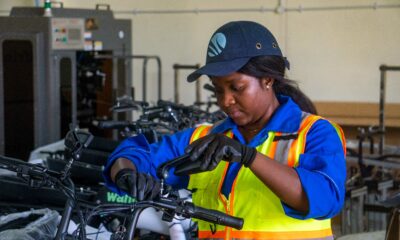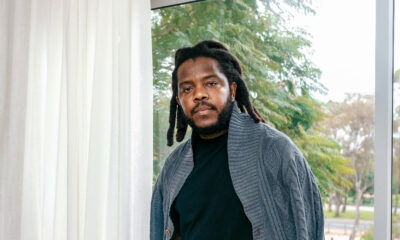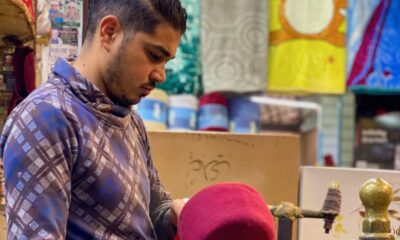Features
Aderonke Adesola is Promoting the Yoruba Language & Gender Equality in Sports Media
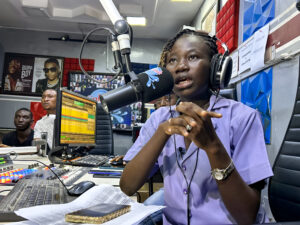
Aderonke Adesola, a passionate Nigerian sports fan, is making waves as a female Yoruba language radio presenter. Her lively commentary and deep sports knowledge have captivated millions – and with the Olympics kicking off, millions more are likely to tune in.
“…and it’s a corner kick for Man City!”
“They’re trying by putting pressure on Arsenal’s No. 18 but their defender Ben White kicked it out, so he isn’t a ‘Ben 10’!”
“Raya is pushing Akanji…while saying ‘Akanji don’t push me?’”
“Pep Guardiola clearly needs a water break!”
“There is no end to the bullets in the guns at Arsenal!”
It’s 6:30 PM on Sunday and Aderonke is live. The popular sports presenter has about three million listeners within Ibadan, Nigeria’s third largest city. Her lively updates and analysis of soccer, motorsports, golf, and even racket sports have fans eagerly tuning in several times a week.
Her show “Jawonsi” means “let them know” in the Yoruba language, and is hosted on Splash FM. The station is based in Ibadan, from where it reaches most of the country’s southwestern Oyo State. The broadcast is entirely in Yoruba, one of Nigeria’s main languages.
Adesola says she’s been obsessed with playing and discussing sports – especially soccer – since childhood. Her mother bought her a radio set after she finished high school. She spent countless hours following sports and debating with her three young brothers about the English Premier League.
Her mother had hoped she would go on to nursing school, but Adesola chose to study mass communications instead.
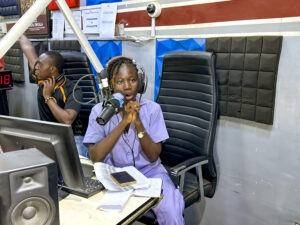
Adesola knew it was going to be difficult convincing sports media owners to front a woman. She was also aware that her desire to present in Yoruba would make breaking through the glass ceiling even harder.
Her determination paid off when she called into her favourite Yoruba sports show to ask a question. The host and producers were impressed by her knowledge, confidence, and her age. She was invited for an internship and was allowed to host the programme.
African media outlets are part of the global industry’s pivot towards youthful audiences, women’s sports, cultural content, and social media integration. Splash FM was ahead of many. In 2019 the station put out a call for Yoruba-speaking sports presenters, specifically women.
Adesola was ready.
‘’I know what I want. I know my onions. I’m disciplined. It is a male-dominated field but I can also be heard, I can also be known, and that’s why I present in a unique way,” she said.
When she is not on the radio, she keeps the banter going on the internet where “Jawonsi” is video streamed. Adesola is known on social media as “Olori Sports”. Olori means “queen” in Yoruba. The Summer Olympics in Paris is currently her hot topic on the air and on social platforms that enable her to reach and engage with followers beyond Ibadan.
She is also now a vocal advocate for gender equality in sports media. ‘’I can’t wait to see more women doing this job. We should also be given as much as the guys, you just need to know your stuff and be passionate,” she said.
Adesola – who recently became a mother – spends considerable time researching and scripting the 30-minute show, which also airs on Mondays, Wednesdays, and Fridays. “I have checks and balances for myself from time to time so that I don’t let my job affect taking care of my home and child,” she explained.
She’s also keen to continue promoting Yoruba culture. The language is also spoken in neighbouring countries like Benin, and Togo, and in the diaspora. According to Ethnologue, a database of languages, cultures, and communities, there are at least 47 million Yoruba speakers.
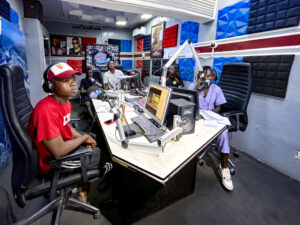
Sunday Adegoke, who lives in Ibadan, is an avid listener of Adesola’s radio show.
‘’I am a Yoruba man and if you can understand what she says, her Yoruba is the real one, it is not the Yoruba of nowadays, it is the bottom line, concrete Yoruba,” said the civil engineer and soccer fan.
Nigeria has a relatively high radio penetration rate, especially in some rural areas where access to other media and the internet is still limited. A study conducted by industry researchers mediaReach OMD in 2020 found that radio reach in Nigeria was at about 81% of the population – or 169.7 million listeners. Adesola has big plans based on radio’s dominance, social media’s exponential growth, and her Yoruba heritage.
“My goal is to work with big brands and organizations that are willing to take Yoruba to the global stage, like Chinese, Korean, Japanese, yes you can also get a translator for Yoruba in the world of sports,’’ she said.
When Adesola is in the studio, however, she’s not thinking about the future. She gets so caught up in the action when commenting live, that she often has trouble staying in her seat. It’s what some refer to as the magic of radio.
Her listeners can’t catch the twinkle in her eye when she’s saying something witty or see her animated expressions. But the sound waves somehow carry her enthusiasm and dedication to the listeners – and they adore her for it.
Akinrinsola Oladayo runs a viewing centre in Ibadan where sports fans can come to watch or listen to local and international matches. There are other Yoruba language sports shows, but he says there’s a reason why Adesola is the queen.
‘’I love the lady’s Yoruba commentary. She adds spices to it. She says things that make you laugh, her ginger (energy) is awesome,” he said.
Story Credit: Zaniel Dada for Bird Story Agency



